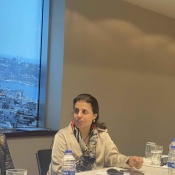In newly edited volume, local and international researchers explore Palestinian urban transformation within their political, historical contexts
In the last few decades, Palestinian cities have undergone several urban transformations over the past two centuries, due to successive political, social, and economic events that occurred in Palestine and the broader Arab region. These changes, and the various socio-political trends that they reflect, are systematically investigated in “The Palestinian City: Issues in Urban Transformation,” a newly released edited volume by Majdi Al-Malki, an associate professor of sociology at Birzeit University, and Salim Tamari, a senior fellow at the Institute of Palestine Studies and a former professor of sociology at Birzeit University.
Published by the Institute for Palestine Studies in September 2021, the volume contains contributions by academics from Birzeit University along with Palestinian, Arab, and international researchers whose interests converge around urban transformations in Palestine. In the volume, the researchers explore the historical evolution of Palestinian cities, touching on their past and present and investigating them as controllers of social, cultural, political and economic life.
The collection of articles have their origins in an eponymous conference held at Birzeit University in 2019, where researchers, academics, architects, artists and experts discussed the history and current status of Palestinian cities and the changes that led to their development in such specific forms.
In its five chapters, the book examines the reconfiguration of urban space in Palestinian cities; the transformations that impacted their morphological and demographic composition; the effect of globalization and neoliberal policies on the formation of new class structures; the social impact of the accelerating urbanization and urban expansion witnessed by these cities, post-Oslo accords, on the components that make up their social structure; the cities’ relationship to their rural surroundings; the mechanisms through which urban resistance movements materialize in them and the role of these movements in strengthening an overall sense of national and cultural identity; and the circulation and intertwining of cultural and political activity from one city to another.
The contributors from Birzeit University are: Majdi Malki, Lisa Taraki, Adel Manna’, Shiraz Nasr, Weeam Hammoudeh and Basil Rayan.







